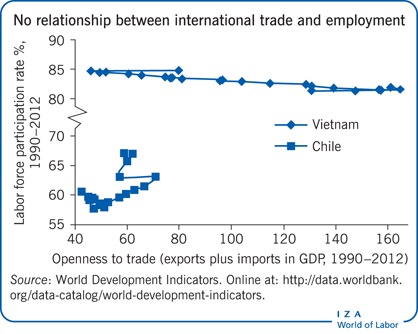Elevator pitch
Trade regulation can create jobs in the sectors it protects or promotes, but almost always at the expense of destroying a roughly equivalent number elsewhere in the economy. At a product-specific or micro level and in the short term, controlling trade could reduce the offending imports and save jobs, but for the economy as a whole and in the long term, this position has neither theoretical support nor empirical evidence in its favor. Given that protection may have other—usually adverse—effects, understanding the difficulties in using it to manage employment is important for economic policy.

Key findings
Pros
The effects of major trade policy changes on aggregate employment are mixed.
Through its effects on the rest of the economy such protection is likely to reduce the jobs available in export-oriented sectors.
Trade reforms do not increase the ratio of informal to formal employment.
Protecting import-competing sectors can increase the number of jobs they offer—or at least reduce the rate of decline.
Cons
In the long term, trade liberalizations can boost employment (at least in developing countries).
More open economies have higher levels of employment, other things being equal.
Trade reform does not appear to cause large reallocations of labor between sectors.
Trade reform may still cause intrasectoral reallocation from less to more efficient firms within sectors.